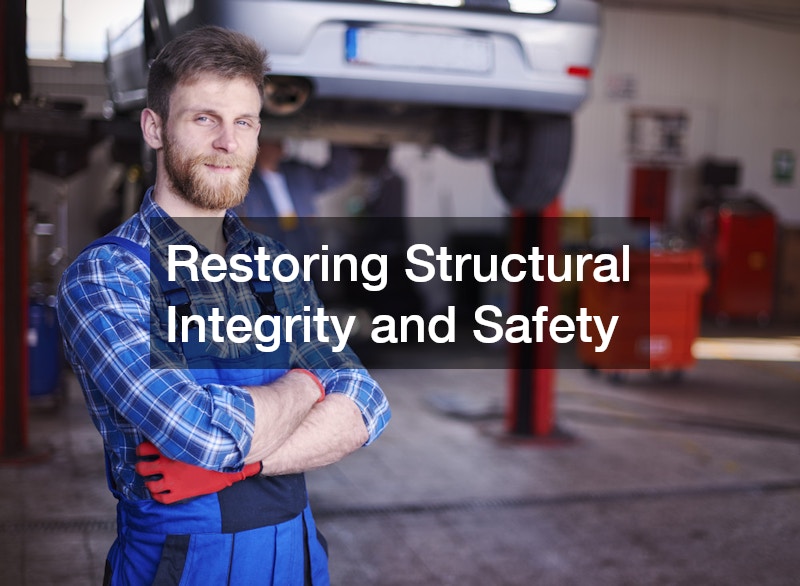Road to Recovery: What Every Driver Should Do in the Weeks After a Car Accident
No one plans for a car accident, but when one occurs, the days and weeks that follow can feel overwhelming. Beyond the initial shock, there’s a long list of steps to take—handling insurance claims, seeking medical attention, managing repairs, and ensuring your vehicle is roadworthy again. The key to recovering smoothly lies in organization, patience, and the right professional help. From legal guidance to mechanical restoration, each decision affects your financial stability, physical recovery, and driving safety. The process doesn’t have to be confusing or stressful if you know what to expect. In this comprehensive guide, we’ll explore what every driver should do in the weeks after an accident—from working with experienced attorneys to scheduling precise repair services. By following these steps, you can rebuild confidence behind the wheel and make informed choices that protect both your rights and your vehicle.
Seeking Immediate Legal Guidance
The first step after an accident is understanding your rights and responsibilities, especially when injuries or property damage are involved. Consulting with the best car accident attorney ensures that you’re not navigating the legal landscape alone. An experienced attorney will evaluate your case, handle communication with insurance companies, and represent your interests if litigation becomes necessary. They’ll also help document important evidence such as police reports, photographs, and medical records. Many people hesitate to contact an attorney immediately, but early legal advice often prevents costly mistakes later in the process. The right professional will help you understand deadlines for claims, negotiate settlements, and pursue compensation for medical expenses or vehicle damage. Choosing a qualified advocate allows you to focus on your recovery instead of getting buried in paperwork and phone calls. Working with legal professionals from the start provides peace of mind and ensures that your rights are protected at every stage of your post-accident journey.
Understanding Your Legal Options

Once you’ve taken the initial legal steps, it’s time to explore available auto accident legal services. These specialized services go beyond simple representation—they include claim management, legal documentation, and mediation between multiple parties involved in the accident. Whether the case involves minor fender-benders or more serious collisions, experts in this field understand how to navigate local laws and insurance regulations. They can clarify who is at fault, determine compensation eligibility, and ensure all documentation is accurate and timely. This level of professional guidance can make a significant difference in the outcome of your case. Working with teams that specialize in vehicle-related law also helps you avoid unnecessary delays or disputes. Many firms offer consultations that help clients understand potential next steps without committing to immediate legal action. In short, leveraging auto accident legal services ensures you receive fair treatment and a smoother, less stressful claims experience after an unfortunate incident.
Repairing the Damage to Your Vehicle
Once legal matters are underway, attention must turn to your vehicle’s condition. Most cars sustain at least some level of body damage during an accident, and professional car body repairs are essential to restore appearance, safety, and structural integrity. Even small dents or scratches can lead to rust or weakened panels over time. Professional repair shops use specialized tools and materials to bring your vehicle back to its pre-accident form, ensuring it looks and performs as it should. Beyond cosmetic improvements, bodywork is critical for maintaining the vehicle’s crash protection systems. Technicians inspect the alignment of panels, frames, and reinforcements to confirm everything meets manufacturer standards. Choosing a reputable repair center ensures that your insurance company’s requirements are met while preserving the value of your vehicle. Taking your car to professionals who prioritize both precision and quality is an investment in safety and long-term durability, helping your car remain dependable for years to come.
Choosing the Right Specialist for Luxury Vehicles

Not all cars are created equal, and some require specialized attention after an accident. If you own a high-performance or imported model, you may need professionals skilled in european car repair services. These experts have in-depth knowledge of complex systems, advanced materials, and manufacturer-specific technologies used in European vehicles. Unlike general auto shops, they understand the intricacies of precision engineering, ensuring repairs meet original design specifications. Using the right diagnostic equipment and genuine replacement parts helps maintain warranty coverage and vehicle performance. For owners of brands like BMW, Mercedes-Benz, Audi, or Porsche, working with specialists ensures that even minor repairs are handled with care and technical accuracy. In addition to body and mechanical work, these technicians also verify that advanced driver-assistance systems function properly after repairs. Choosing qualified professionals for European models guarantees a seamless restoration that preserves the car’s luxury, performance, and safety standards.
Evaluating Engine Performance After the Accident
Even if your car appears undamaged on the outside, internal components can suffer after a collision. In some cases, accidents cause hidden damage that requires thorough inspection and potential car engine replacements. Modern engines are complex and sensitive, meaning even minor misalignments can lead to long-term issues if left unaddressed. Mechanics can evaluate components like mounts, radiators, and electrical systems to detect any impact-related failures. In severe collisions, replacing the engine may be necessary to restore full functionality and reliability. Though it might seem like an extreme measure, installing a properly fitted engine extends your car’s lifespan and improves performance. Certified technicians follow manufacturer guidelines during replacements to ensure safety and compliance with emissions standards. Investing in professional assessment prevents unexpected breakdowns and ensures your vehicle continues running smoothly after the repair process is complete. Prioritizing engine inspections immediately after a crash helps you avoid larger and more expensive repairs later.
Consulting With Injury Specialists

Your physical well-being is as important as repairing your vehicle. If you’ve experienced pain, soreness, or mobility issues after a crash, consulting a personal injury attorney may be a wise step. They can help you secure compensation for medical expenses, lost wages, and long-term rehabilitation. Many injuries—such as whiplash or soft-tissue trauma—may not present symptoms immediately, so it’s crucial to seek medical and legal help early. A dedicated attorney will coordinate with healthcare providers to gather documentation that supports your case. They’ll also work to ensure insurance settlements reflect both current and future medical needs. Having legal guidance not only reduces financial strain but also ensures your recovery is prioritized. The attorney’s expertise in accident-related injury law can make a significant difference in the outcome of your claim. Taking this step early helps protect your health, your finances, and your ability to move forward confidently after a collision.
Replacing or Sourcing Vehicle Components
Once repairs and legal matters are addressed, attention should turn to ensuring your vehicle’s replacement parts are safe and compatible. High-quality auto parts play a crucial role in restoring your vehicle’s integrity and performance. Whether you’re replacing bumpers, headlights, or suspension components, it’s vital to choose OEM (original equipment manufacturer) parts that meet your car’s exact specifications. Cheaper alternatives might save money upfront but often lead to reduced performance or safety. Professional repair facilities can help you source certified parts that meet or exceed industry standards. By using the right components, your vehicle maintains proper alignment, safety ratings, and warranty compliance. Homeowners who take the time to confirm part authenticity ensure a smoother repair process and better long-term value. Investing in quality materials gives your car a renewed lifespan and ensures it performs safely under all driving conditions. The right parts make all the difference in recovery and reliability.
Restoring Structural Integrity and Safety

Following a collision, restoring your vehicle’s structure requires more than surface fixes. Scheduling local auto collision repairs ensures that your car undergoes a complete inspection and proper reassembly. Professional technicians assess everything from frame alignment to paint finish to guarantee the vehicle meets manufacturer standards. Advanced repair facilities use computerized measuring systems to detect even the smallest structural deviations. Skilled mechanics then realign and reinforce these areas to ensure maximum crash protection. Working with reputable collision specialists also helps verify that all airbags, crumple zones, and sensors are functioning correctly. Timely collision repairs prevent small problems from escalating and protect your vehicle’s resale value. Whether the damage is minor or extensive, the expertise of local technicians ensures your car is safe and visually restored. Choosing a trusted repair center close to home saves time, ensures personalized service, and keeps your vehicle in top condition for the years ahead.
Ensuring Proper Balance and Handling
After an accident, even if your car feels fine to drive, its alignment may be compromised. Scheduling local tire alignments is one of the most overlooked but critical steps in post-accident maintenance. Proper alignment ensures that all four tires make even contact with the road, promoting better handling, fuel efficiency, and tire longevity. Misalignment can cause uneven wear, poor steering response, and vibration at high speeds. Professional alignment services use precision equipment to measure and adjust your suspension angles according to manufacturer specifications. This process not only improves performance but also prevents further stress on other vehicle components. Regular alignment checks are recommended every six months or immediately following a collision. By ensuring your tires and suspension are balanced, you reduce the risk of future mechanical problems and make your driving experience safer and smoother. It’s a simple yet powerful way to maintain the comfort and control of your vehicle.
Finding Brand-Specific Expertise
Drivers of luxury vehicles often require specialized care after an accident. For instance, if you drive a BMW, visiting a center that specializes in local bmw repair ensures your vehicle receives attention from technicians familiar with the brand’s unique design and engineering. These experts have access to specialized diagnostic tools, repair equipment, and original manufacturer parts tailored for your model. Unlike generic shops, BMW-certified facilities understand the intricacies of the brand’s performance systems, electronics, and safety features. Whether you need cosmetic restoration, engine diagnostics, or electronic recalibration, trained specialists ensure the work is completed to exact standards. This type of service not only maintains the car’s performance and warranty coverage but also preserves its value over time. For owners of premium vehicles, the peace of mind that comes with expert, brand-specific service is invaluable. Investing in qualified professionals helps guarantee that your car performs as intended once it’s back on the road.
Staying Organized During Recovery
One of the most important but frequently overlooked aspects of post-accident recovery is organization. Keeping track of documents such as insurance claims, medical reports, and repair invoices can save you time, frustration, and potential disputes down the line. Create a folder—digital or physical—to store all relevant paperwork, including police reports, witness statements, and correspondence with attorneys or repair shops. Maintaining a detailed record helps ensure transparency between you and your service providers. It also assists your legal team should you need to reference timelines or verify expenses. Additionally, document the progress of your repairs with photos before, during, and after the process. This extra step provides tangible proof of the work completed and may help if future issues arise. Staying organized also means scheduling regular follow-ups—checking with your repair shop on estimated completion dates and confirming your insurance payments are processed. A structured approach minimizes stress and keeps your recovery on track.
Prioritizing Emotional Recovery and Confidence
While the physical and mechanical aspects of an accident are important, emotional recovery often takes longer than expected. Many drivers feel anxious, distracted, or hesitant to return to the road after a collision. These feelings are completely normal and should be acknowledged rather than ignored. Taking time to rebuild your confidence behind the wheel can make a tremendous difference in your overall well-being. Start by practicing short, local drives in familiar areas before tackling highways or heavy traffic again. Some drivers find that taking a defensive driving course helps restore focus and control. Discuss your experience openly with family, friends, or a counselor if you’re struggling with anxiety. The goal is to gradually reestablish a sense of security and control. Remember, healing from an accident extends beyond repairing a vehicle—it’s also about regaining independence, trust, and comfort in your driving routine. With patience and the right support, both your car and your confidence will recover fully.
Recovering from a car accident takes more than simply fixing what’s broken—it requires a thoughtful, step-by-step approach that addresses legal, mechanical, and personal aspects of the experience. By consulting experienced attorneys, seeking proper medical and legal guidance, and partnering with skilled technicians, you ensure both your rights and your vehicle are fully protected. Whether it’s evaluating engine performance, sourcing reliable parts, or restoring your car’s structural integrity, each decision plays a crucial role in long-term recovery. The process may seem daunting, but following a structured plan transforms chaos into control. Taking the time to find reputable professionals—from body specialists to alignment experts—will help you rebuild confidence and safety behind the wheel. Remember to stay organized, prioritize emotional health, and seek help when needed. The road to recovery after a collision isn’t just about getting your car back—it’s about restoring peace of mind and ensuring every mile ahead is safe, stable, and worry-free.
